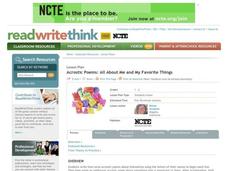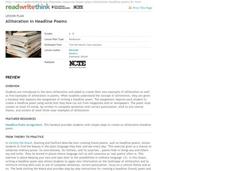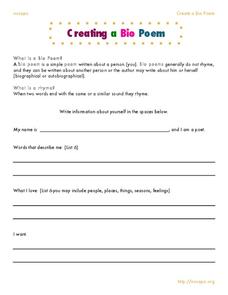Core Knowledge Foundation
Sixth Grade Poetry
Study some of the most prominent poets and works of poetry in history with a language arts poetry unit. From Virgil to Shakespeare to Dickinson to Angelou, the resources present biographies and examples of poetic elements to the sixth...
Houghton Mifflin Harcourt
Around Town: Neighborhood and Community: English Language Development Lessons (Theme 3)
Here is a unit designed to support English language development. Scholars speak, move, and write to learn more about topics that focus on community and local concepts. The series of lessons aids to reinforce concepts including consonant...
Loudoun County Public Schools
Figurative Language Packet
A definitive resource for your figurative language unit includes several worksheets and activities to reinforce writing skills. It addresses poetic elements such as simile and metaphor, personification, hyperbole, and idioms, and...
Houghton Mifflin Harcourt
A World of Animals: English Language Development Lessons (Theme 10)
Animals are the theme of this series of English language development lessons. Scholars take part in grand conversations about woodland, jungle, and grassland animals. They also go on picture walks, read poems and high frequency words,...
National Council of Teachers of English
Acrostic Poems: All About Me and My Favorite Things
Budding poets create two acrostic poems, one for their name and another using a word of their choice. Over the course of five days, scholars compose, revise, publish, and share their work with their peers.
ReadWriteThink
Alliteration in Headline Poems
Poetry is everywhere you look! Create found poems using headlines from newspapers and magazines. Young poetry focus on creating alliterative phrases with words they find in headlines, tying their poems to a central theme.
Poetry4kids
How to Write an Exaggeration Poem
The best poetry writing lesson of all time is here for you! Learn all about the art of exaggeration with a lesson on exaggeration poems, which instructs students to use wild imagery to convey their message.
Teachnology
Shape (Or Concrete) Poems
Poetry comes in all shapes and sizes. Young writers pick a shape, select words and phrases that describe how the shape makes them feel, and create a shape poem. A raindrop example and step-by-step instructions give your budding poets a...
Poetry4kids
How to Write a Tanka Poem
Take your haikus to the next level with tanka poems, another form of Japanese poetry that regulates the length and rhythm of each line by syllables. Young writers read the explanation, examples, and tips for tanka poems before writing...
Poetry4kids
How to Write a “Backward” Poem
If you like poetry, wait till you try backward poetry! Young writers read Shel Silverstein's "Backward Bill" before writing their own funny poems that are full of backward imagery and phrasing.
K12 Reader
If
Rudyard Kipling's advice to his son in the poem "If" is a resounding message that echoes through generations. After reading the famous poem, middle schoolers work on analyzing specific lines, completing activities based on unfamiliar...
Hong Kong Special Administrative Region
Learning English through Poems and Songs
Exposing learners to the power of words in poetry is a stimulating way to learn languages. Songs, haikus, rhyming words, and narrative works are all employed in a resource for teaching English as a Second Language.
Poetry4kids
How to Write a “Favorite Things” List Poem
If your students made a list of their favorite things, would writing poetry be on it? After this poetry writing lesson, it might! Young writers make a list of what they like—or what they don't like—before crafting the list into a rhyming...
National Center for Families Learning
The Summer Fun Summer Learning Poetry Unit
Focus on poetry this summer to enhance those comprehension, fluency, and language skills with a set of resources intended to explore different types of poetry, specifically lyric poetry. The daily activities contain differentiation ideas...
K12 Reader
Writing Valentine Poetry
The rose is red, the violet is...what comes next? Write a beautiful Valentine's Day poem based on the rhyme scheme and format of "The Valentine" by Joseph Ritson.
Curated OER
Maniac Magee: Found Poem
Instruct your readers to scrounge through the pages of Maniac Magee in search for descriptive passages or words they may use to write poetry. As they look for meaningful, sensory descriptors in Jerry Spinelli's novel, readers connect to...
Moore Public Schools
Lyric Poetry
Discover lyric poetry through a reading of Sympathy by Paul Laurence Dunbar and analyze its meaning with three short-answer questions covering symbolism, personification, alliteration, metaphors, and similes.
Welcome to Ms Bosello's Class!
Alliteration Worksheet
Alliteration and imagery are two vital parts of any well-written poem. Encourage your young poets to include these devices with a set of activities designed to get them thinking, writing, and creating.
Novelinks
Tuck Everlasting: Similes, Metaphors, and Personification in Imagery
Poetic language is abundant in Natalie Babbitt's beautiful novel, Tuck Everlasting. Learners note the examples of similes, metaphors, and personification they find as they read, and illustrate how the language creates a sensory...
A to Z Teacher Stuff
The Gingerbread Man
You may not be able to catch the Gingerbread Man, but you can sing a catchy song about him! Incorporate a poem into a study of poetry and/or the alphabet in the weeks leading up to Christmas.
Houghton Mifflin Harcourt
Down on the Farm: Challenge Activities (Theme 8)
Down on the Farm is the theme of this series of challenge activities. Extend your scholars' learning experience with engaging activities such as designing a farm, creating collages, writing poems and to-do lists, and playing dominoes.
E Reading Worksheets
Tone Worksheet 5
A speaker's attitude toward his or her subject matter determines the tone of a piece of literature. Interpret the tone of four different poems, as well as their meanings, with supporting textual details.
Nosapo
Creating a Bio Poem
Find out what's special about your pupils with a fun biopoem activity! As they fill out their name, words that describe them, what they love, and what they dream of, learners create an expressive poem about themselves.
Scholastic
Sky
Lead your class through a writing exercise that explores personification. After listening to the teacher read a poem that personifies the sky, they go step by step through the writing their own personification poems.

























